This popular culture icon is nowadays described to us as a sad and vulnerable figure, timid and unsure – a far cry from the frivolous, joyful and radiant star that she was for her contemporaries.
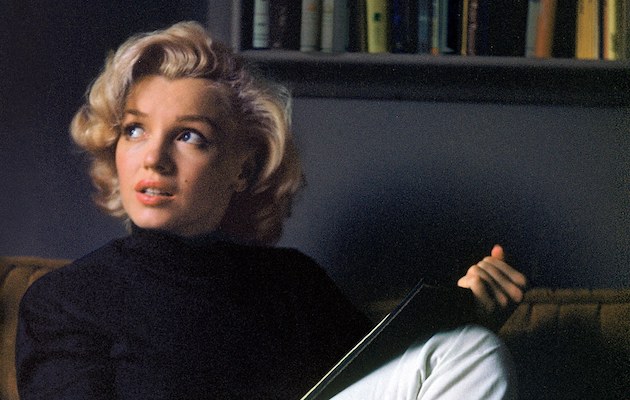 If, like Marilyn, we see our identity and value as being based on our work or relationships, we will be constantly frustrated.
If, like Marilyn, we see our identity and value as being based on our work or relationships, we will be constantly frustrated.
Seldom does a summer go by without Marilyn Monroe's death – now 57 years ago – being remember with the disclosure of some new finding.
This time it was the discovery of new photographs of her corpse, which have been presented in a documentary by Fox. This popular culture icon is nowadays described to us as a sad and vulnerable figure, timid and unsure – a far cry from the frivolous, joyful and radiant star that she was for her contemporaries.
How could a girl with success, fame, money and beauty commit suicide?
“You know the way to the place where I am going” – the pastor A.J. Soldan read out in a trembling voice. In his hands he held not only a bible, but also the inevitable question of all those who stood before him: why?
That midday in 1962 at the mortuary chapel in Westwood Village, those who gathered to say farewell to Norma Jean – Marilyn's real name – shot cursory glances at her ex-husband, the baseball champion Joe Di Maggio, and at her acting coach Lee Strasberg, while golden loud-speakers blared out Tchaikovski's sixth symphony.
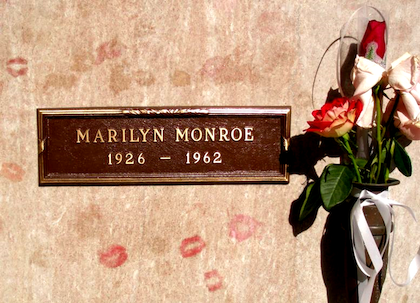 Many wonder how could a girl with success, fame, money and beauty commit suicide.
Many wonder how could a girl with success, fame, money and beauty commit suicide.When Reverend Soldan finished his reading, DiMaggio went up to the bronze coloured coffin and closed the lid. Marilyn was no longer in there. All that remained was a body that vaguely resembled her.
They had given her a wig and used a lot of make up to cover up a face – now revealed by the police photos – destroyed by the autopsy. A posy of teacup roses was laid in the sleeping blonde’s hands and she was covered under her favourite green chiffon scarf.
IN SEARCH OF THE FATHER
Rivers of ink have flown about Marilyn. We know about her addiction to tranquillizers, her relationship with the Kennedys, her marriage to DiMaggio and to the playwright Arthur Miller, her lateness, her unhappy childhood and her insecurity in front of the cameras.
She was fearful and neurotic, she loved reading and she loved Miller, for whom the last thing she wanted to be was a "dumb blonde".
Marilyn first got married at the age of 16 – the legal age for marriage in California – to a sailor, much older than her, to escape the care of the state, after having been fostered with various families – her father was unknow and her mother was deemed mentally unstable.
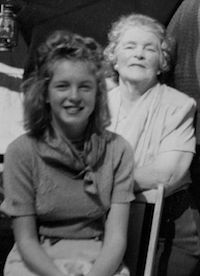 Marilyn's grandmother had been baptized by Aimee Semple McPherson, the founder of the International Church of the Foursquare Gospel.
Marilyn's grandmother had been baptized by Aimee Semple McPherson, the founder of the International Church of the Foursquare Gospel. DiMaggio, to whom she was only married for a few months, was older again. And Arthur Miller was also older, although not as much as he seemed!
Shortly after her wedding to Miller, she went to London to shoot scenes for the film The Prince and the Showgirl. One day while they were still in England, she found Miller's diary and read an entry where he said that he was disappointed in her and ashamed at her behaviour, doubting whether he was really in love with her. This was an extremely upsetting discovery and she suffered a miscarriage that summer.
WHAT DID MARILYN BELIEVE IN?
Marilyn's grandmother had been baptized by Aimee Semple McPherson, the founder of the International Church of the Foursquare Gospel. Marilyn spent seven years of her childhood in Hawthorne, near Los Angeles, with the Bolenders, her grandmother's neighbours.
She once recalled how everyone there spoke to her of God and told her that she should not offend him. The Bolenders went to the United Pentecostal Church and Marilyn accompanied them, attending Sunday school on Sunday mornings and another meeting on Wednesday evenings.
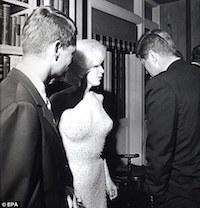 Rivers of ink have flown about her relationship with the Kennedys.
Rivers of ink have flown about her relationship with the Kennedys.Her mother was a Christian Scientist – the religion founded by Mary Baker Eddy in the nineteenth century, and which many mix up with scientology – as was her aunt, with whom she lived as a teenager. Marilyn however converted to Judaism when she married Miller.
In 1953 she had a conversation about religion with actress Jane Russell, while they were filming Gentlemen Prefer Blondes: "Jane tried to convert me, and I tried to introduce her to Freud", she recalled.
The sex symbol of the 1940s, who had appeared in Howard Hughes' The Outlaw, had started the Hollywood Christian Group, a weekly Bible study at her home, attended by many believers in the film industry. Marilyn had, however, adopted psychoanalysis as her religion.
FEAR AND PSYCHOANALYSIS
In order to get into the Actors Studio in New York and get to know the peculiar "method" acting that they followed, Strasberg told her that she should undergo psychoanalysis.
Starting in the spring of 1955, Marilyn would go three to five times a week to the practice of Margaret Hohenberger, a Jewish analyst of Slovak origin, who had come over from Vienna. She is the one that she called when her marriage ran adrift upon the discovery of Miller's doubts, shortly after their wedding.
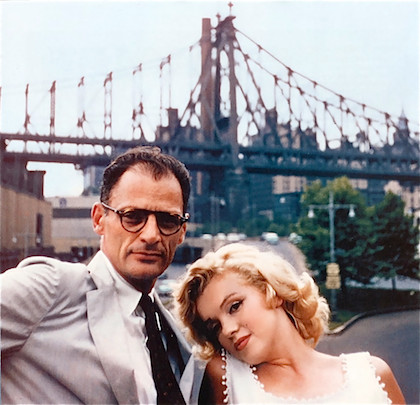 Her marriage to the playwright Arthur Miller was envied by many.
Her marriage to the playwright Arthur Miller was envied by many.When she and Miller divorced in 1961, she checked herself into the Payne Whitney psychiatric clinic due to a growing dependence on alcohol and pills.
A series of misunderstandings led to her being put in an isolation cell. From there she called Joe DiMaggio, who had her transferred to the Columbia University Medical Centre.
Her "nightmare" was to end up in a psychiatric hospital like her grandmother and her mother, with some form of hereditary madness – according to her analyst, Dr Greenson, who discovered her lifeless body not long afterwards. Psychoanalysis was not able to save her.
LOOKING IN THE WRONG PLACE
Marilyn was looking for love in the wrong place. Without it, life has no meaning.
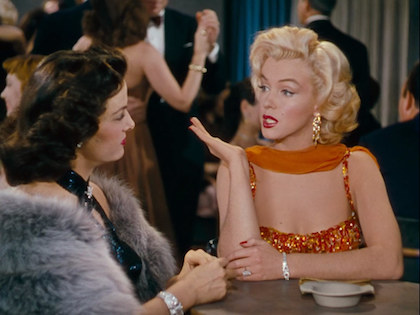 Jane Russell tried to convert me, Marilyn told about the founder of the Hollywood Christian Group, a weekly Bible study at her home.
Jane Russell tried to convert me, Marilyn told about the founder of the Hollywood Christian Group, a weekly Bible study at her home.In Mere Christianity, C.S. Lewis says that "Most people, if they had really learned to look into their own hearts, would know that they do want, and want acutely, something that cannot be had in this world", given that "there are all sorts of things in this world that offer to give it to you, but they never quite keep their promise".
We can therefore blame ourselves, thinking that we are a failure – like Marilyn did – or we can, as others do, decide that the world around us is to blame for all the frustration that we feel.
We can become hardened, cynical and empty, or, as Lewis did, seek out life in God. He reasons that "[i]f I find in myself desires which nothing in this world can satisfy, the only logical explanation is that I was made for another world", a supernatural and eternal one.
If, like Marilyn, we see our identity and value as being based on our work or relationships, we will be constantly frustrated. Christians do not achieve everything they desire in this life, but look forward to achieving it "when Christ appears" because "then [they] also will appear with him in glory" (Colossians 3:4).
The only arms that can give you your heart's desire are those of the crucified Christ. His sacrifice offers us a love that will never disappoint. That was the hope that Marilyn needed and that we still have: Christ's love, which forever satisfies "the hope of glory" (1:27).

Las opiniones vertidas por nuestros colaboradores se realizan a nivel personal, pudiendo coincidir o no con la postura de la dirección de Protestante Digital.
Si quieres comentar o